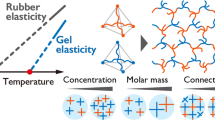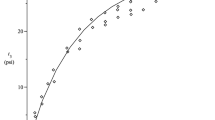Abstract
RELAXATION phenomena in gelatine solutions were first studied by Schwedoff1 (1889), who found a relaxation of applied stress of the form where F is the stress at time t, F0 is the initial stress, Fy is the residual stress, and Ï is the relaxation time.
This is a preview of subscription content, access via your institution
Access options
Subscribe to this journal
Receive 51 print issues and online access
$199.00 per year
only $3.90 per issue
Buy this article
- Purchase on Springer Link
- Instant access to full article PDF
Prices may be subject to local taxes which are calculated during checkout
Similar content being viewed by others
References
Schwedoff, Th., J. de Phys., 8, 341 (1889).
Hatschek, E., and Jane, R. S., Koll. Z., 39, 300 (1926).
Berglund, D. T., Acta Chim. Scandinavica, 1, 857 (1947).
Schofield, R. K., and Scott Blair, G. W., Proc. Roy. Soc., A, 138, 707 (1932).
Hatschek, E., Koll. Z., 28, 210 (1921).
Alfrey, T., "Mechanical Behaviour of High Polymers" (Interscience, New York, 1948).
Author information
Authors and Affiliations
Rights and permissions
About this article
Cite this article
GRAY, V. Discontinuous Flow Phenomena in Gelatine Gels. Nature 164, 584–585 (1949). https://doi.org/10.1038/164584a0
Issue Date:
DOI: https://doi.org/10.1038/164584a0
This article is cited by
-
Recherches optiques sur les processus d'�coulement dans les solutions collo�dales
Kolloid-Zeitschrift (1956)
Comments
By submitting a comment you agree to abide by our Terms and Community Guidelines. If you find something abusive or that does not comply with our terms or guidelines please flag it as inappropriate.



